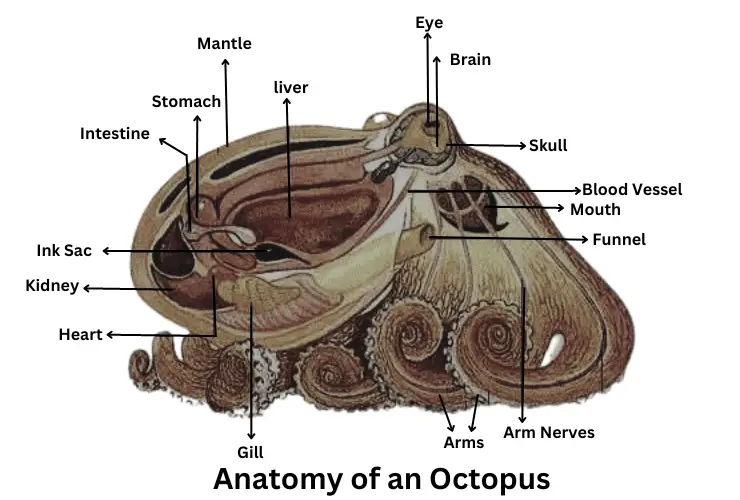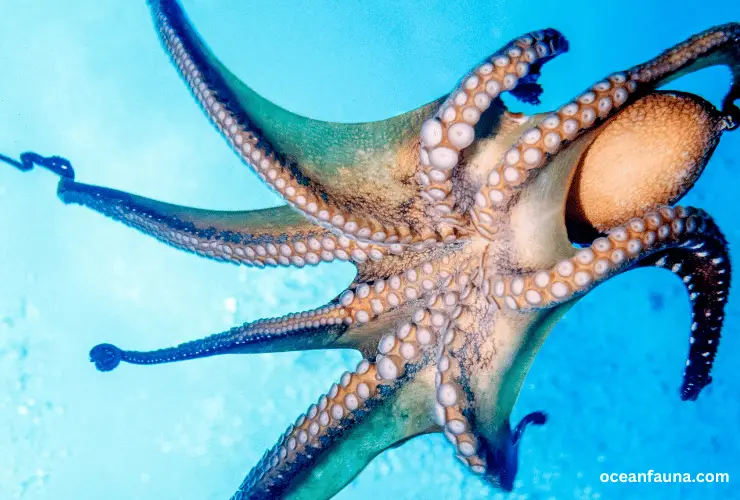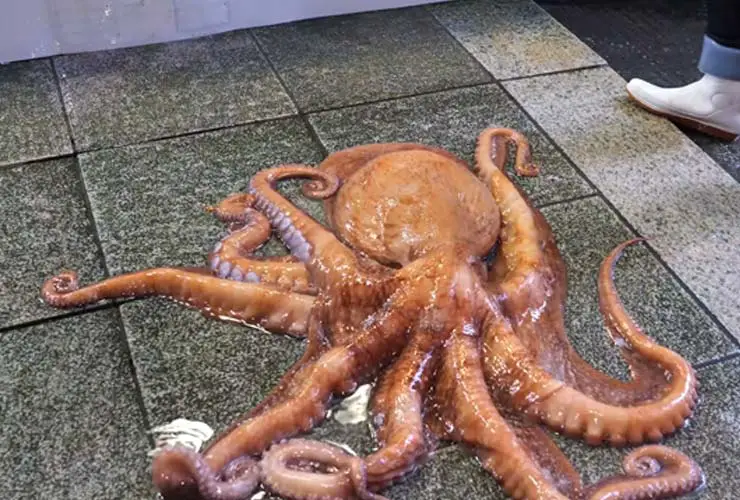Octopuses breathe by extracting oxygen from the water through specialized organ called gills located inside their mantle cavity. These gills remove oxygen from the water and transfer it into the bloodstream. Octopuses cannot breathe air like humans and other land animals.
In this article, we will explore the mechanisms behind octopuses’ respiration and gain a better understanding of how these creatures manage to survive underwater.
Whether you’re a marine biology enthusiast or just curious about the natural world, this article will provide valuable insights into the remarkable biology of the octopus.
So, let’s get started.
How Do Octopus Breathe?
Octopuses have a specialized respiratory system. It allows them to extract oxygen from the water in which they live and release carbon dioxide.
Unlike humans and most other land animals, which breathe air through their lungs, octopuses have specialized gills designed for extracting oxygen from water.
The gill of an octopus is located in a chamber near the entrance to the mantle cavity. This is the body cavity that contains the heart, digestive system, and reproductive organs.

When the octopus takes in water through its mouth, it flows over the gills. Oxygen in the water is diffused into the bloodstream and carbon dioxide is released.
The water is then expelled from the mantle cavity through a specialized opening. And then the oxygen-rich blood is pumped to the rest of the body by the heart.
The gills of an octopus are highly efficient at extracting oxygen from the water. It allows them to survive and thrive in their underwater environment.
They are also highly adaptable and can adjust the rate at which they extract oxygen in response to changes in the water’s oxygen levels.
It is important for octopuses to live in well-oxygenated water to ensure that they are able to breathe effectively.
If the water they live in is not well-oxygenated, or if the levels of oxygen in the water become too low, they may struggle to breathe. Not only that they eventually could suffocate and die.
Lastly, octopus gills are highly efficient and adaptable, but octopuses still require a well-oxygenated environment to survive.
Do Octopus Need Air?
Octopuses are aquatic creatures and do not need air in the same way that humans and most land animals do. They extract the oxygen they need to survive from the water in which they live, using specialized respiratory organs called gills.
These gills allow them to extract oxygen from the water and release carbon dioxide, so as long as the water they live in is well-oxygenated, they are able to survive and thrive.

It is important to note that while octopuses do not need air in the traditional sense, they still require a well-oxygenated environment to survive.
If the water they live in is not well-oxygenated, or if the levels of oxygen in the water become too low, they may struggle to breathe and could eventually suffocate.
Additionally, octopuses are susceptible to other environmental factors such as water temperature and acidity. So, it is important for them to live in an environment that is appropriate for their species.
In summary, octopuses do not need air in the traditional sense, but they do require a well-oxygenated environment to survive.
How Octopus Gills Work?
Octopus gills are finely tuned to extract oxygen from water, and they play a crucial role in the creature’s survival. The gills are made up of thin, flat membranes that are well-suited for oxygen exchange.
The water flows over the gills, and oxygen is taken in through the membranes and into the bloodstream. At the same time, carbon dioxide is released from the bloodstream and into the water.
This continuous exchange of oxygen and carbon dioxide allows the octopus to extract the oxygen it needs from the water and to release waste products.
Roles of Siphon in Octopuses’ Respiratory System
The role of the siphon (often called funnel) in the respiratory system of an octopus is critical. The siphon is a tube-like structure located near the gills, which is used to help the octopus control its buoyancy.
In addition to its buoyancy function, the siphon also plays an important role in the octopus’ respiration. When the octopus needs to breathe, it pumps water over its gills using its siphon. So that it can extract oxygen from the water and release carbon dioxide.
The siphon helps to regulate the flow of water over the gills, which is essential for maintaining proper respiration.
Why Do Octopuses Need Water to Breathe?
It is crucial to understand that octopuses have gills that are only capable of extracting oxygen from water and not from air, unlike humans and other land animals who breathe through their lungs. Thus, octopuses require a watery environment to survive, as they need adequate oxygen levels in the water to breathe.
In addition to providing a source of oxygen, water plays a vital role in supporting the octopus’s movements, regulating its body temperature, and protecting it from predators and other environmental hazards.
Ultimately, it’s clear that an octopus’ world revolves around water. Their gills, finely tuned for oxygen extraction, require a liquid environment to function properly. And for the octopus as a whole, water is vital for sustaining all of its physiological processes, including breathing.
Can An Octopus Breathe Out of Water?
Octopuses do not have the ability to breathe out of water. They belong to the cephalopod family, which means “head-foot.”
If an octopus is taken out of the water, it will quickly suffocate because it does not have any other means of obtaining oxygen.

Octopuses are not capable of breathing air through the lungs or any other type of respiratory organ. They can survive for only a few minutes out of water. However, the time span can vary depending on several factors, such as the size of the octopus and the ambient temperature.
Lastly, octopuses are strictly aquatic creatures that cannot breathe out of water. They are highly dependent on their gills to extract oxygen from the water. They cannot survive for long periods of time outside of their aquatic environment.
Also Read: How Long an Octopus Can Survive Out of Water?
Can Octopuses Drown in Water?
No, octopuses cannot drown in water because they do not breathe air in the same way that terrestrial animals do. However, while octopuses cannot technically “drown,” they can still suffocate if the water they are in becomes depleted of oxygen.
This can happen in various ways, such as if the water becomes stagnant. Or another reason is if there is an overabundance of other aquatic organisms that consume a lot of oxygen.
In these cases, the octopus will not be able to extract enough oxygen from the water to survive. And it will suffocate as a result.
Additionally, octopuses are also susceptible to other types of suffocation if they become trapped in small spaces or if they are unable to move freely in the water.
For example, if an octopus becomes trapped in a tight crevice or under a heavy object, it may not be able to move enough to extract enough oxygen from the water, and it could suffocate as a result.
Octopuses cannot drown like terrestrial animals, but they can suffocate if the water lacks oxygen or if they are restricted in movement.
FAQs
How Long Can an Octopus Breathe Air?
Although octopuses can temporarily survive on air for about 20-30 minutes, this is not their primary method of obtaining oxygen. Octopuses primarily use their gills to extract oxygen from salt water, as this is their preferred means of respiration.
Can Octopus Crawl on Land?
Although octopuses have the ability to crawl short distances on land when required, it’s not a common occurrence.
This exceptional feat is attributed to their high level of mobility and pliability compared to other cephalopods, making it easier for them to navigate on solid ground.
Though most octopuses only venture onto land when in peril or in search of food, a handful of species have been known to take extended excursions, leaving the ocean behind to investigate their surroundings.
Conclusion
Octopuses breathe by extracting oxygen from the water through their gills, which are located inside their mantle cavity. The gills are finely tuned structures that are well-suited to the task of oxygen exchange, and they play a crucial role in the octopus’s survival.
Understanding how octopuses breathe is an important part of appreciating the incredible adaptability of these fascinating creatures.
